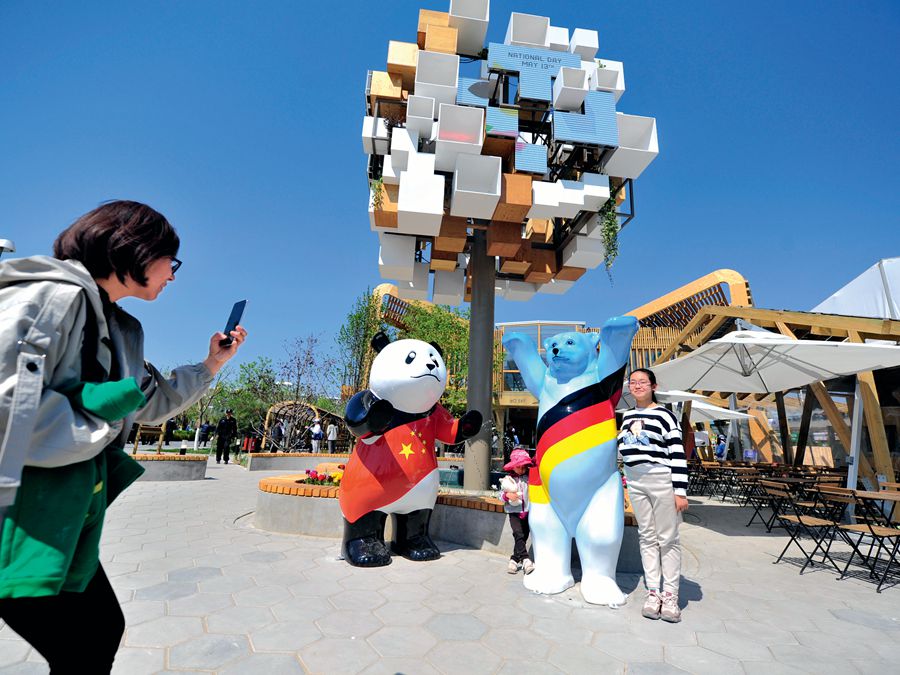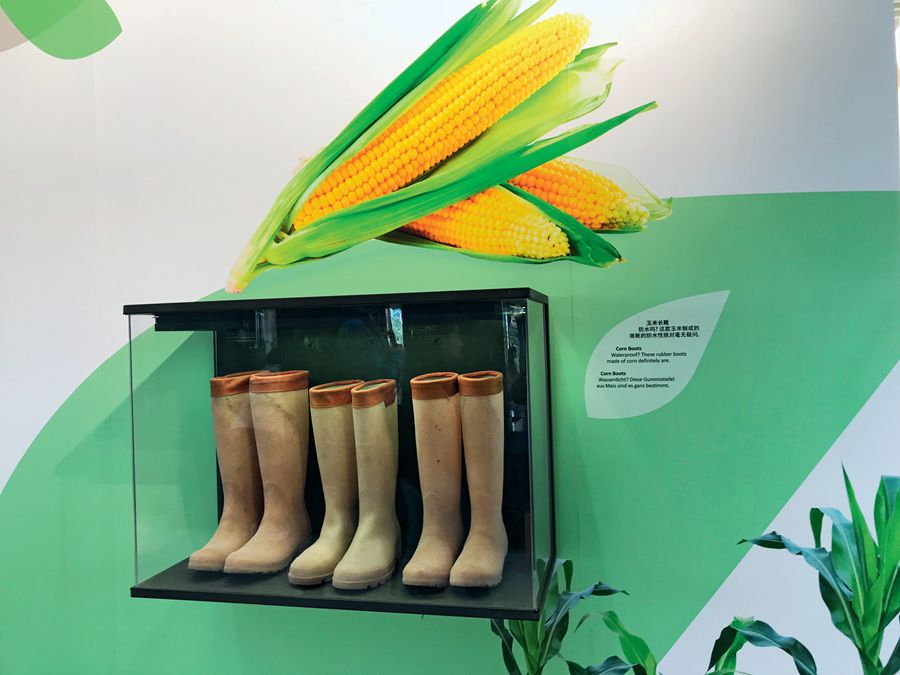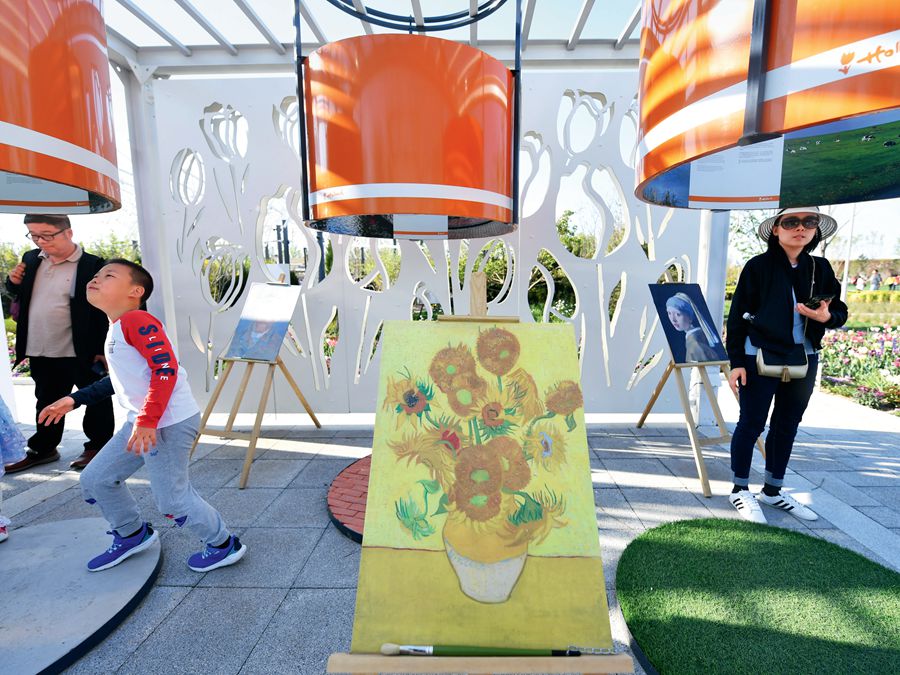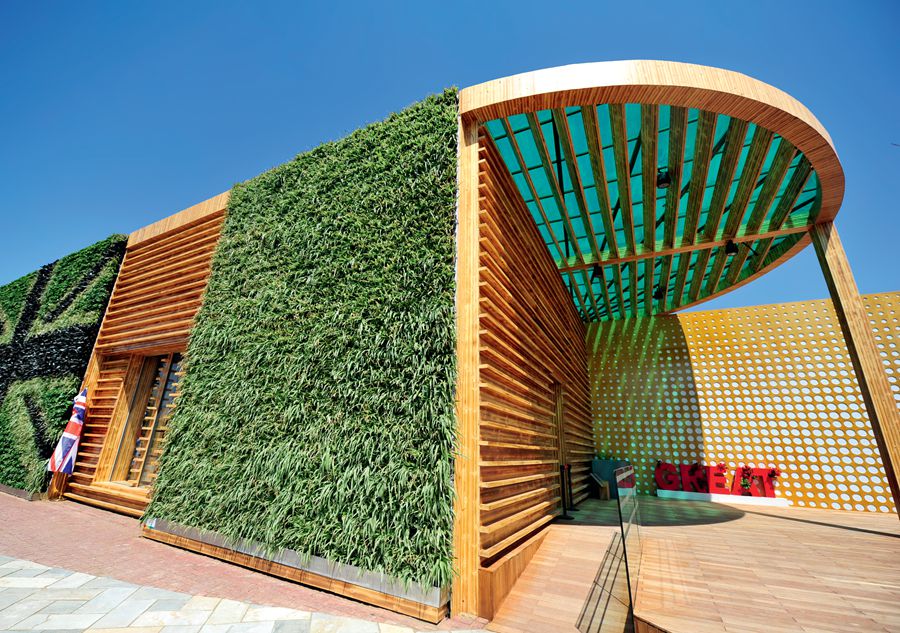RAPID economic development, globalized enterprise activities, and rapidly advancing urbanization on the one hand, environmental and climate protection, the need for sustainable development, and the creation and preservation of a green living environment on the other – the two seemingly contradictory facets of our reality often become the subject of discussion both in the media and in public perception.
However, the needs for social and economic progress and green development do not necessarily have to be diametrically opposed, but could just as well go hand in hand. In fact, sustainability and environmental protection can even offer many business opportunities for economic development, a reality which is currently being highlighted at the Beijing International Horticultural Exhibition.
A Dutchman’s Ecological Dream in China
Dutchman Bert Dautzenberg earns his living through sustainable technology in China. The landscape architect who has been living in China for a decade now has developed his own patent for an ecological roof and wall filter cladding system based on the principle of sponge cities.

Designed around the theme of “Seeding the Future,” the German Pavilion aims to show the contribution of modern horticulture and advanced technology to the sustainable development of cities, and to demonstrate the significant role of horticulture in modern life through renewable raw materials and products.
Dautzenberg’s conceivably simple yet highly effective solutions for the use of rainwater fills up one whole corner in the exhibition area of the Dutch Pavilion at the Expo.
As a world leader in horticulture, especially in the international flower trade, Holland exported cut flowers worth € 3.7 billion worldwide in 2018. However, those who only think of tulips when it comes to Holland are merely scratching the surface.
“In China, we focus on greenhouse production with a particular focus on hi-tech horticulture,” says Wouter Verhey, agriculture counselor to the Embassy of the Kingdom of the Netherlands in Beijing. “In China, we are implementing modern large-scale projects with high investment and state-of-the-art technology in many places,” he said.
According to Verhey, the special characteristic about the Chinese market is its dynamism and Chinese people’s great enthusiasm and openness for new technologies. “The people here are extremely eager to learn, which helps us to achieve rapid progress in the field of horticulture in China,” said the agricultural and horticultural expert.
Landscape architect and business founder Dautzenberg has witnessed China’s development in the horticultural field for over one decade. “In the past, the aim was often just to build green cities as quickly as possible. The visual was the main focus. Now, you can clearly see a trend towards quality,” he said.
Chinese policymakers have also set the right course for achieving greater sustainability, he said. “President Xi Jinping has repeatedly stressed the importance of ecological development. I think that under his leadership there is a good chance of making a difference when it comes to green development,” said Dautzenberg.
For Dautzenberg, sustainable city life is not only a passion, but also a career. He set up his own company in China, Hanging Water Tank, and has already successfully tested his ecological claddings in pilot projects in climatically different Chinese metropolises such as Dalian, Shenzhen, and Beijing. Now he is hoping for widespread application. He regards the Expo as an excellent opportunity to raise people’s awareness of the importance of green spaces in cities.
German-Chinese Cooperation for More Sustainability
Only a few steps away from the Dutch Pavilion lies the German Pavilion. It catches the eye from afar with its striking wooden construction.

The German Pavilion features exhibits made from natural or renewable materials, such as waterproof rain boots made from corn.
As one gets closer, one sees not only pots containing decorative plants, but fruits and vegetables placed along the ascending wooden struts of the outer facade of the pavilion, and parts of this facade can rotate and change their position. This is an intelligent, computer-controlled balcony system, as Hans-Joachim Fuchtel, Parliamentary State Secretary at the Federal Ministry of Food and Agriculture of Germany and member of the German parliament, explained. He has traveled to the Chinese capital especially for the International Horticultural Exhibition 2019.
“In the long term, we humans will not succeed in producing fruits and vegetables only on a horizontal area-wide basis. It is also important to look upwards. Urban farming is therefore one of the approaches we would like to address here at the German Pavilion,” said Fuchtel.
The intelligent balcony construction developed by German engineers makes it possible to plant and harvest fruits and vegetables on building walls. “Here in Beijing, we want to present alternative ideas for cultivation that are of great relevance for a country like China, where there are many high-rise buildings in urban areas,” Fuchtel told China Today.
The smart balcony is just one of the sustainable product ideas that amaze visitors to the German Pavilion. Inside, more green visions of German product designers can be seen that aim at ensuring more sustainability in the shopping cart.

Green city is the theme of the Dutch Pavilion at the 2019 Beijing International Horticultural Exhibition.
On display are maize rubber boots, waterproof, stylish natural-looking shoes made of tree mushrooms, and hipster sneakers made of coffee that not only look good but also smell nice.
Not crazy enough yet? Well, the exhibits also include car tires made of dandelion rubber, bio-compostable plant pots, and coffee cups made of sunflower shells and vitamin-rich spectacle cases made of orange peels by Düsseldorf designer Elise Esser.
Certainly, the mass production of such goods is still a dream of the future, but the German organizers have succeeded in showing what can be done if one has the necessary courage and vision.
One area where products made in Germany already make life and work greener and more sustainable today is agriculture, an important economic sector for China as well.
In Germany, one tenth of farmers already use drones to optimize field work, as explained in the Expo Pavilion. Color analyses carried out from the air, for example, allow conclusions to be drawn about the need for fertilization and watering and also about the correct harvest time.
Modern hi-tech drones already enable even more sustainable agricultural work today and ensure more animal- and plant-friendly cultivation using fewer fertilizers. Last but not least, technical innovations such as these offer Germany and China new opportunities for industrial cooperation.
“China too, is already very advanced in terms of drone development. There is close cooperation in this field between our two countries, which is clearly based on reciprocity,” said Fuchtel.
The German politician sees the Expo in Beijing as an important platform for the exchange of ideas. “Among other things, we want to emphasize that information technology can and must also serve the goal of sustainability. An exhibition like this one in Beijing will undoubtedly help to awaken new ideas,” Fuchtel said.
The International Horticultural Expo is also an important event for German entrepreneurs, he stressed. “The German agricultural sector as such currently produces one third of its output for export. China is an important target country. In many areas, German supply and Chinese demand mesh with each other very well.”
All in all, the German parliamentarian was optimistic that the green cooperation between Germany and China will further expand in the future.

The British Pavilion is themed on building a green future through innovation, in the hope that the strengths of the U.K. in addressing challenges during its development can be demonstrated.
“I was delighted that Xi Jinping at the Second Belt and Road Forum for International Cooperation put the Agenda 2030 for Sustainable Development at the center of his speech. I agree with him that we must create greater awareness in order to meet the challenges ahead and bring more sustainability into our lives,” said Fuchtel.
“Here at the Expo in Beijing, practically the whole world is present, which offers good conditions for entering into dialogue and discussing sustainability issues,” Fuchtel stated.
Health-improving Function of Plants Highlighted
At the British Pavilion, which is only a few minutes’ walk north of the German exhibition area, the Expo is seen as an opportunity to strengthen mutual exchange.
Sara Everett, the U.K. commissioner general of the International Trade Department of Britain and project director of the British Pavilion at the Expo 2019 Beijing, said, “We want to use this Expo as a platform to bring British and Chinese experts together and show our Chinese partners what we are doing in the U.K. and vice versa to build a stronger relationship. That’s also why in the upcoming months we’re organizing a whole series of events at the British Pavilion on green urban development, the theme of this year’s Expo.”
“On the one hand, we want to show people how they can grow the plants that can be seen here in the expo garden themselves, for example on vacant open spaces in their own community,” she said. On the other hand, she explained the aim is to show how the plants can be used even more actively in food and other natural products for a healthier life.
Plants embody not only a tangible market value as the raw material of green products, but also an intangible value for individual life and human society, as Everett emphasized. Stressed out urban dwellers could benefit from the healing power of greenery. “A well-designed garden is capable of supporting people’s physical and mental health – this health-improving potential of gardens, for example outside hospitals, has already been proven in various medical and other scientific studies,” explained Everett.
Particularly as far as the health-promoting power of the plant world is concerned, Everett sees great potential for bilateral cooperation – in scientific as well as economic sense.
This applies, for example, to the field of traditional Chinese medicine, she said. “The idea of using natural remedies against diseases is a growing trend in our country. We have a lot of demand and potential to learn from China in this regard.”
Looking Forward to Fruitful Results from the Expo
Wouter Verhey, Hans-Joachim Fuchtel, and Sara Everett – they all confirm that the ties of their countries to China in the field of horticulture are becoming ever closer, both in the scientific and economic fields.
The Dutch landscape architect Bert Dautzenberg knows that the decisive fertilizer for good cooperation, however, is a friendly relationship and mutual trust. This mixture forms the ideal breeding ground for growing together and finding answers to the great questions of sustainability of our time, which ultimately affect all countries.
“From my own experience, I know that where human contacts and friendships develop, things begin moving forward. And in order to get something, you always have to give something as well,” said Dautzenberg.
Sometimes it also becomes apparent through personal encounters and on closer inspection that faraway countries like China and the Netherlands, for instance, are not as different in some respects as you might think.
“The per capita agricultural area in Holland is almost the same as China,” said Wouter Verhey. “So in terms of the per capita burden we have the same pressure on agricultural areas in Holland as we do here in China, and we therefore face similar problems to some extent.”
Sara Everett from the British Pavilion also agrees that the Expo is above all, a platform for personal encounters, “The great thing about this horticultural expo is that we physically come together, meet each other, discuss and show each other things,” she said.
We can therefore look forward to seeing which seeds will be sown in the direct dialogue in Beijing and which cooperative plants will emerge after the end of the event.



